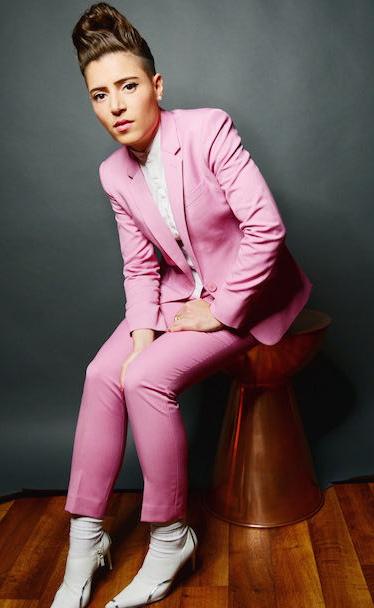Genres merge and Emily King shines in stellar Nu Deco Ensemble opener

Singer-songwriter Emily King performed in Nu Deco Ensemble’s season-opening concert Thursday night at The Light Box.
The Nu Deco Ensemble attracts the youngest, liveliest and most engaged audience of any classical group in South Florida. A cross between a cutting-edge new music collective and a 21st-century version of a pops orchestra, the 31-member pickup band opened its third season on Thursday night at The Light Box in Miami’s bustling Wynwood arts district. The program was typically eclectic, spanning electronic music, light classical and cross-cultural pop.
Conductor and co-artistic director Jacomo Bairos has assembled some of the area’s best freelance musicians, and the orchestra’s performances are consistently well-rehearsed and musically precise. Bairos opened the evening with Henry Mancini’s Strings on Fire and those who know Mancini only for his ballads “Moon River” and “Days of Wine and Roses” might be surprised at how varied his output actually was. This brilliant showpiece easily surpasses in sheer invention similar scores such as Leroy Anderson’s Fiddle Faddle or David Rose’s Holiday for Strings. Co-artistic director Sam Hyken’s arrangement added brass and a busy percussion battery, and the group articulated Mancini’s perpetual motion tour de force at lightning speed.
Judd Greenstein’s City Boy is an immensely appealing chamber jazz work, scored by the New York City-based composer for flute, clarinet, double bass, guitar and piano. A continuous keyboard line underpins short wind figurations that merge into a winning groove. Pianist Maria Zdralea kept that pulse going while flutist Daniel Velasco and clarinetist Anna Brumbaugh vibrantly conveyed Greenstein’s melodic curves.
Nu Deco also showcased a gifted Los Angeles composer, Daniel Wohl, who specializes in electro-acoustic music. Two scores demonstrated Wohl’s exceptional skill in that genre, and Bairos and his accomplished players gave finely detailed, delicately nuanced readings of both.
The fifth movement from Wohl’s dance work Cycles mixes processed samples of percussion sounds with five live wind, string and percussion players. With quasi-rock rhythms emanating from the electronics, much of the score’s melodic material is played by mallet percussion. A quieter, more reflective second part spotlights violin and cello.
The second section of Wohl’s Replicate (arranged by Hyken) layers live and electronic textures. The misty sonorities of brass and string motifs might be characterized as “Debussy in the rainforest.” After the hyperactive first section, an air of sensuality permeates the calm stasis of the writing for strings, marimba and xylophone. Unlike many scores in which the electronics seem merely pasted on, Wohl’s music is organically conceived and flows in a coherent manner that entices the ear.
New York singer-songwriter Emily King’s influences span soul, rhythm and blues, and mainstream pop. It was her distinctive sound and ability to make a lyric come alive that commanded the stage on Thursday. With a throaty timbre and dusky lower register, King cajoled and pleaded her way through the emotional roller-coaster ride of “Out of the Clouds.” Aided by Hyken’s rich brass and string-oriented chart, she demonstrated sophisticated song styling with “Georgia.” King is an artist to be reckoned with.
Hyken is one of the few arrangers who can orchestrate rock convincingly for orchestral performance. Too often such projects are embarrassments; none more so than Richard Hayman’s Boston Pops scoring of songs by The Beatles, Simon and Garfunkel and the score for Saturday Night Fever, which reduced those milestones to elevator music.
Hyken’s imaginative medleys of leading rockers and bands have been highlights of previous Nu Deco concerts. The Starman, a David Bowie compilation performed on Thursday, was his most ambitious offering yet. Comprising ten songs from throughout Bowie’s 40-year career, the suite lasted twenty five minutes but seemed half that long.
Opening with a dark thematic pulse from the album Low, Bowie’s collaboration with Brian Eno, Hyken’s medley gave the orchestra a workout and really made it rock and swing. Gabriel Colby’s amplified trombone solo wailed with pizzazz and Tim Leopold’s trumpet soared, infusing Bowie with a shot of Miles Davis- and Dizzy Gillespie-style modern jazz. Aaron Lebos’ smoldering guitar superbly channeled Stevie Ray Vaughan on Bowie’s Let’s Dance album. Bairos brought moody tension to the theme from the film Labyrinth and he closed with a high-octane burst: a swinging big band version of “Sue,” from Blackstar, Bowie’s final album.
Nu Deco Ensemble repeats the program 8 p.m. Friday and Saturday at The Light Box, 404 NW 26 Street in Miami. nu-deco.org
Posted in Performances, Uncategorized
Leave a Comment
Fri Oct 27, 2017
at 4:28 pm
No Comments